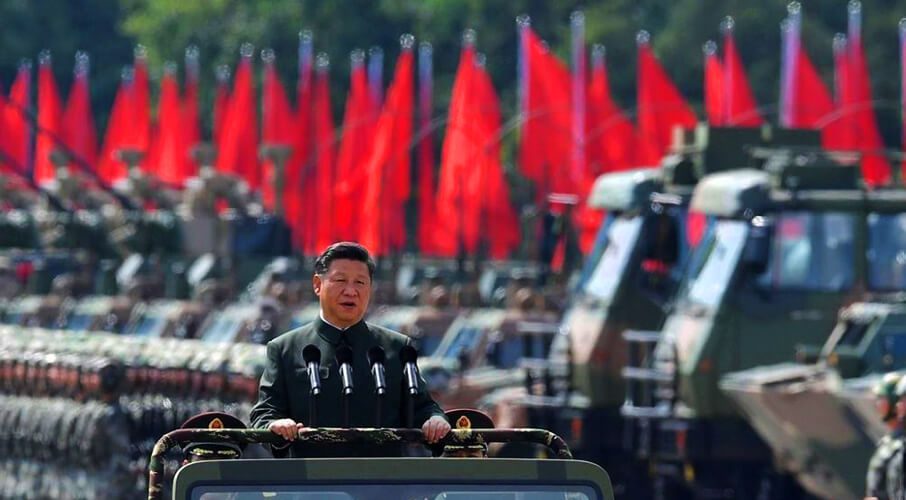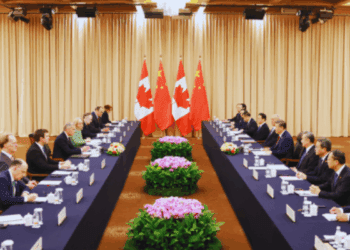 Well before Donald Trump came to power, when more accommodating forces were in charge in Washington and other capitals, Beijing was already seeking to undermine the international system. Playing nice clearly isn’t the solution, writes J. Michael Cole.
Well before Donald Trump came to power, when more accommodating forces were in charge in Washington and other capitals, Beijing was already seeking to undermine the international system. Playing nice clearly isn’t the solution, writes J. Michael Cole.
By J. Michael Cole, July 8, 2019
A recent open letter in the Washington Post has sparked serious soul-searching within the China watching community, pitting those who believe the U.S. is wrong in treating China as an existential threat against those who believe that accommodation has failed. Written by M. Taylor Fravel, J. Stapleton Roy, Michael D. Swaine, Susan A. Thornton and Ezra Vogel, the letter, titled “Making China a U.S. enemy is counterproductive,” was also signed by dozens of American academics. Partly blaming the U.S. for the deterioration in bilateral ties, the letter was quickly seized upon by Chinese media and CCP officials who no doubt saw a chance to create a moral equivalence and exacerbate divisions within the community of China hands in the U.S. and elsewhere.
Over at the South China Morning Post, Chinese foreign ministry spokesman Geng Shuang said he welcomed the “rational and objective voices and opinions” in the letter. “China and the U.S. are not enemies,” he said. “We definitely cannot allow conflict and differences define the current state of Sino-US relations, and even more than that, we cannot let bias and misunderstanding control the future of our relations. “We believe that objective, rational, accommodating voices will win over those prejudiced, fanatical, zero-sum positions.” Similar themes were repeated in an op-ed published by the Global Times, a Chinese Communist Party (CCP) mouthpiece.
One of the key contentions in the open letter is the idea that China does not pose an “existential security threat” to the U.S. and the international order. Another is the idea, naive in light of developments in China since Xi Jinping’s emergence, that more accommodation and engagement — i.e., a return to the policies of previous U.S. administrations — would somehow empower less nationalistic, or more “dovish,” elements within the CCP.
Others, such as the indefatigable Bill Bishop, have weighed in on the matter and countered the arguments advanced in the letter. Below is my personal response, which admittedly is colored by my experiences as a politically involved resident of Taiwan and observer of cross-Strait politics.
One thing is certain: the open letter has sparked a formidable discussion in various China forums. Agree or not, I have tremendous respect for many of the signatories, and have learned a lot from them over the years. Some have even become friends. My personal disagreement with a number of the points made in the letter in no way diminishes my admiration for those individuals and their achievements. I have no doubt the letter was drafted in the spirit of getting as close as we all can to the “truth” and to avoid causing further damage to our ailing international system.
I weigh in from the “narrower” perspective of one who specializes on cross-Strait relations and who has been a resident of Taiwan under three presidencies — Chen Shui-bian, Ma Ying-jeou and Tsai Ing-wen. Over the years, it has become clear to me that rather than being a “domestic” or purely local matter, the “Taiwan issue” is one that belongs to the international community as a whole, with Taiwan serving as an example of “what can be” if a society decides to embrace democracy and rule of law. Thus, Beijing’s handling of and behavior toward Taiwan is, in many ways, an indication of how we can expect it to behave elsewhere, especially when it bumps into the democratic ideals that characterize the other side of the ideological divide — and an ideological divide is what this all about.
Any notion that we can meet China halfway in a way that does not contradict the fundamental ideals that make us who we are is, if you’ll forgive the term, delusional.
From my vantage point, it is indisputable that Beijing seeks to dictate to and to change us, something that has become all the more evident since Xi took the helm. Any notion that we can meet it halfway in a way that does not contradict the fundamental ideals that make us who we are is, if you’ll forgive the term, delusional. The cost of better relations with Beijing is this: incremental capitulation on the CCP’s terms, as Beijing will construe our flexibility as a sign of weakness to be exploited. Anything else is treated with contempt, threats, and interference. The notion that the bilateral relationship between Washington and Beijing has soured due largely to the actions of the Trump administration has ominous echoes for people here in Taiwan, where it is democratic Taipei, rather than authoritarian Beijing, that is supposedly responsible for the current state of affairs, for “angering” Beijing and increasing tensions. I’m sorry, but that’s poppycock. If I’m right that Taiwan is a canary in the mineshaft for the rest of the world, then it is pure folly to assume that less confrontational behavior on our part would yield a better behaved CCP. And I’m sorry, but Beijing’s recent efforts at the U.N. hardly convince me that China isn’t trying to displace the U.S. and rewrite the world order in a way that is more open to authoritarian governance and anathema to a human rights-based order.
I expect little reciprocity from a regime that countenances — sorry, operates — concentration camps in Xinjiang, that threatens war against a peaceful democracy, and that has no compunction in relying on violence-prone triads to undermine the society and institutions which “Taiwanese compatriots” have chosen for themselves. That is not to mention, as a concerned Canadian, that the regime is now in the business of kidnapping foreign nationals and now reportedly has denied one of them, Michael Kovrig, access to his reading glasses. The Trudeau government in Ottawa was nothing if not dovish toward Beijing, and look where that landed Canada. How all of this does notconstitute an existential threat is the question indeed.
Yes, pushback against the CCP needs to be calibrated, and no doubt there are areas where the current U.S. administration could improve. But we mustn’t lose sight of the fact that the course-correction which has led to a more robust response to Beijing’s belligerence and attack on the international system began well before Trump entered office. And this has nothing to do with Trump or Bolton. I see it every day in the interactions between Taiwan and staff from American Institute in Taiwan, the Department of State and other U.S. agencies I have had a chance to work closely with in the past year — a firm, heartfelt desire to work more with Taiwan in a constructive manner.
We also must remember that even before Xi came to power, when more accommodating forces were in power in Washington (Thornton, one of the letter’s drafters, among others), Beijing was already starting to undermine the international system. One need only look at what was already going in in Xinjiang. It’s therefore hard to see this can all be Trump’s fault, all his faults notwithstanding.
Sadly, and for all the ostensible good intentions of the letter’s drafters and signatories, Chinese media are jumping on this occasion, selectively translating and reporting parts of it in a way that clearly puts the blame on Trump and the U.S. I expect the CCP will do its utmost to extract as many concessions as it can, and to split us, thanks to this opening. If there is one thing I have witnessed and learned from in Taiwan over the years, it’s the CCP’s ability to exploit and exacerbate any and all contradictions to divide us and undermine our ability to counter its activities coherently.
J. Michael Cole is a Taipei-based senior fellow with the Macdonald-Laurier Institute in Ottawa and a senior fellow with the Global Taiwan Institute in Washington, DC. He is a former analyst with the Canadian Security Intelligence Service (CSIS) in Ottawa.




